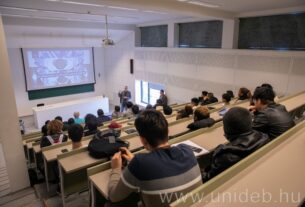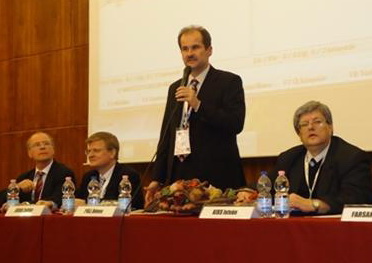The University of Debrecen signed a consortium cooperation agreement with 15 Hungarian higher education institutions in Budapest on Wednesday at the Ministry of Foreign Affairs and Trade. The aim of the UniSpace Hungary Consortium is to develop new training.
In recent years, the University of Debrecen has focused on space research, and one of the topics of the Thematic Program of Excellence is called Space Research (DE-SPACE). The Nuclear and Space Competence Center, established in the summer of 2020, will provide the professional background for the further development of UD’s space activities. The university is still conducting research in several areas. In addition to cosmic radiation, the effects of microgravity on astronauts, and the conditions and consequences of long-term presence, the processing of space-based data is the focus of research. An important milestone was that the institution hosted the open day of the International Astronaut Congress last fall. The participating foreign astronauts promoted space science to high school students and high school students in the field of science and technology and learned about the UD space research program.
With Wednesday’s agreement, the university’s space research activities have reached a new level. The consortium cooperation concluded at the Ministry of Foreign Affairs and Trade, of which 15 other Hungarian higher education institutions are members in addition to the University of Debrecen, aims to enable universities with competence in space research and technology to develop a coordinated training system with specialized training. The contract was also signed by Péter Sztáray, State Secretary for Security Policy at the Ministry of Foreign Affairs and Trade, and József Bódis, State Secretary at the Ministry of Innovation and Technology.
On behalf of the University of Debrecen, Ákos Pintér, Deputy Rector General, signed the agreement. The head of the university explained to hirek.unideb.hu that the coordinated program focuses on four main fields of science: natural sciences, medical and health sciences, technical sciences, and social sciences.
Our institution is one of the four key universities in the consortium. In addition to the compulsory subjects that are part of space education, students can also take elective subjects in four disciplines. During the implementation of the program, our university is responsible for the field of living natural sciences as well as medical and health sciences
– informed Ákos Pintér.
The implementation of the program enjoys special government support, after the approval of the maintainer and the Senate, and the completion of the necessary official procedure, is scheduled to start in September this year.
hirek.undeb.hu
Photo: illustration.

















